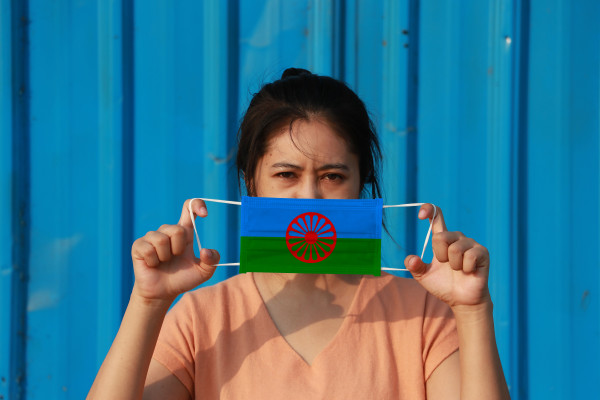The impact of Covid-19 on Roma communities in the European Union and the Western Balkans
Together with partners from seven EU Member States, five Western Balkan countries and Turkey, ERGO Network has prepared an in-depth study about the devastating impact that the Covid-19 pandemic had and continue to has on Roma and Travellers across Europe.
The data collected in this survey confirms that marginalized Roma and Travellers are amongst the most affected and impacted by Covid-19, mainly due to their devastating living conditions and exclusion, triggered by widespread antigypsyism. As this study suggests, during the pandemic many Roma and Travellers living in poverty found it very hard to protect themselves from getting the virus because of lack of access to water and sanitation. This was even harder for those living in segregated and informal settlements and/or improvised shelters.
Despite some positive responses regarding immediate measures taken by some governments and local authorities to assist vulnerable groups, including Roma and Travellers, increasing concerns from our members called for more consolidated data in order to better understand the situation of Roma and Travellers in the EU and Western Balkans and Turkey. The data is necessary to advocate for better institutional and political coordination and a focus on minimising the impact of the pandemic in its second and/ or third wave on vulnerable communities including Roma and Travellers.
As a result, ERGO Network together with its members and partner organisations prepared national surveys in seven EU countries and six Western Balkan countries and Turkey. The results of this survey constitute the basis of this report. Besides data on key areas of access to education, employment, basic needs, health and housing, migration, discrimination and gender aspects, it also includes recommendations from the respondents themselves as well as from ERGO Network.
This survey was possible thanks the valuable contributions from ERGO members and partners. We would like to thank in particular Roma Active Albania in Albania, Otaharin in Bosnia and Herzegovina, expert Orhan Tahir in Belgium, Integro in Bulgaria, Slovo 21 and Life Together in Czechia, Amrita OBK association in Hungary, Pavee Point in Ireland, Voice of Roma Ashkali and Egyptians in Kosovo, RROMA in North Macedonia, Nevo Parudimos in Romania, Roma Forum in Serbia, Roma Advocacy and Research Centre in Slovakia and Zero Discrimination association in Turkey as well as Roma and Traveller communities in all the respective countries.
We especially thank the Fundación Secretariado Gitano (FSG) whose survey on the Covid impact (1) on Roma in Spain was used as inspiration for our ERGO survey.
For more information about ERGO Network’s work on anti racism contact Isabela Mihalache , Senior Policy Adviser in the ERGO Network Brussels team.
ERGO Network carried out this work in the framework of the project “Roma Included in Social Europe”, funded by the EaSI Programme (all parts concerning EU Member States) and in the framework of the project “Romani Women Power of Change “ (all parts concerning Western Balkans and Turkey) carried out as a partner of Roma Active Albania and funded by the European Union.

 This publication has received funding from the European Union. The information contained in this publication reflects only the authors’ view, and its contents not necessarily reflect the views of the European Union. The European Union is not responsible for any use that may be made of the information it contains.
This publication has received funding from the European Union. The information contained in this publication reflects only the authors’ view, and its contents not necessarily reflect the views of the European Union. The European Union is not responsible for any use that may be made of the information it contains.
 This publication has received financial
This publication has received financial
support from the Foreign Office of the
Federal Republic of Germany.
(1) https://www.gitanos.org/actualidad/archivo/131067.html.en









